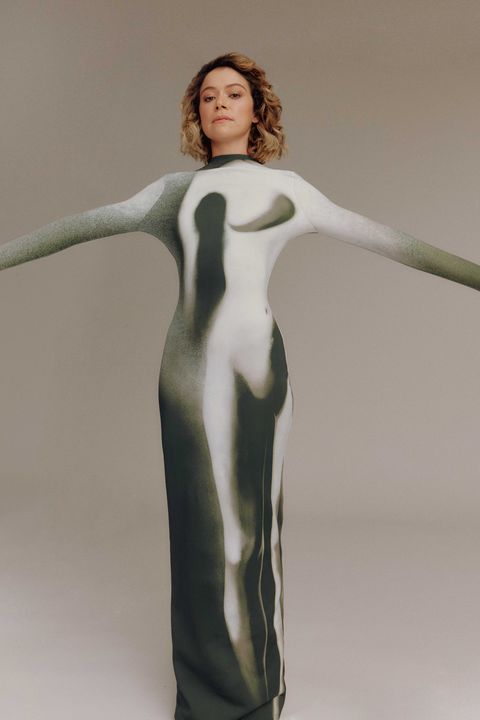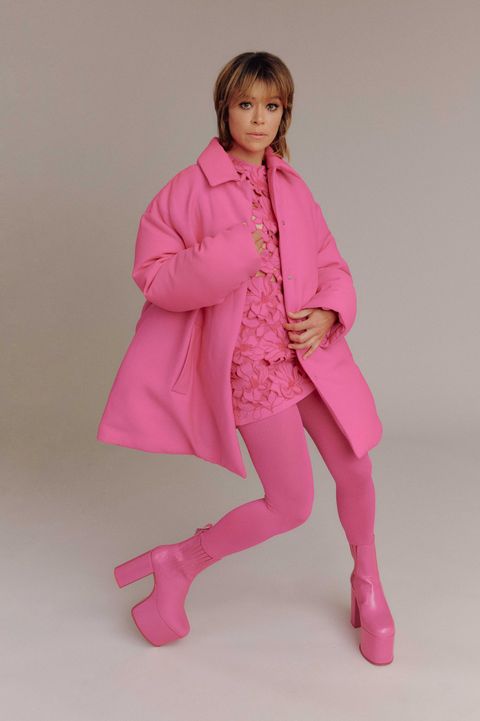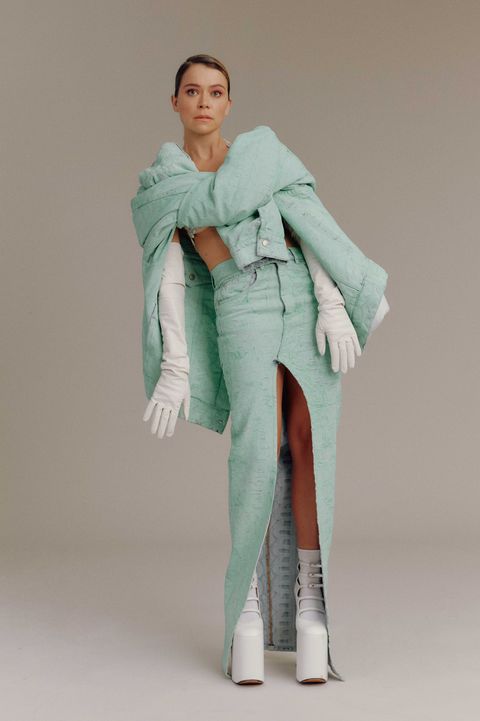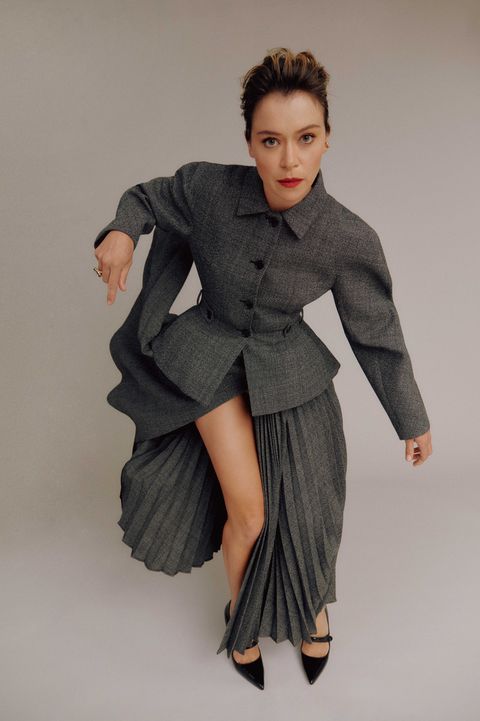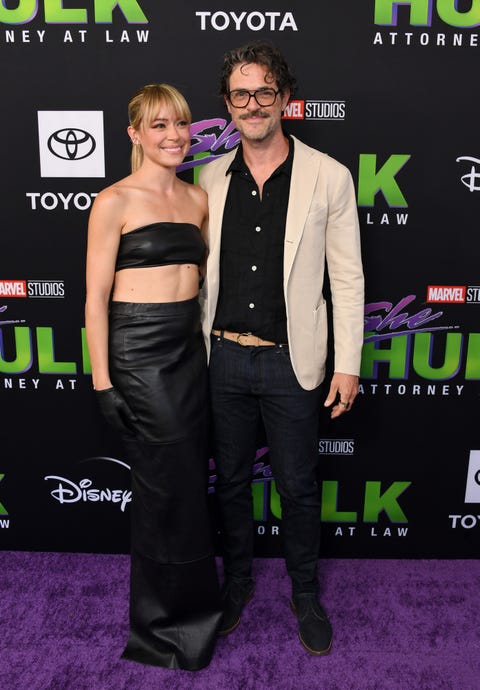How to put this delicately: There’s this thing about her face. It’s a friendly face, heart-shaped, with an apple-cheeks smile muffled by dyed curls the color of frothed coffee and honeycomb. Yet it morphs at every angle, like one of those 3-D portraits expanding and contracting depending on the viewer’s perspective. Almost-but-not-quite hazel eyes add to a mischievousness imbued by her famously fine-pointed incisors. As Tatiana Maslany likes to put it, her face is “watery,” prone to melting into another without forewarning. Such a face allowed the Emmy award-winning actress to convince audiences she was a dozen different clones in the beloved sci-fi series Orphan Black. Now, it’s allowed her to take on the guise of a 6’7” green-skinned superhero with a bombshell blowout and calves the size of boulders.
Jennifer Walters, the titular attorney in the new Disney+ series She-Hulk: Attorney at Law, ultimately crushed Maslany’s “reticence” about joining the packed Marvel Cinematic Universe. She-Hulk, which premieres on Disney+ tomorrow, granted Maslany her first lead role since Orphan Black wrapped its fifth and final season in 2017. Instead of cruising her Emmy high directly into the next headliner, she snuck quietly into theater and supporting or ensemble roles, including the wife of Jake Gyllenhaal’s Jeff Bauman in the Boston Marathon bombing drama Stronger; the ratings-hungry producer Diana Christensen opposite Bryan Cranston in the Broadway hit Network; and evangelical preacher Sister Alice in the HBO period drama Perry Mason. When she was announced as the next Marvel superhero, her cult following—which refers to themselves as the Clone Club—rejoiced. Maslany shielded both her pleasure and her apprehension well.
“I had always been wary of entering this universe or doing anything of this scale,” Maslany admits when we meet for the first time over Zoom. “There’s a part of me that always feels a bit more comfortable in a smaller piece. Just something that I can guarantee will be focused on character, guarantee will be collaborative.”
Her She-Hulk audition arrived “at this very raw, very interesting time for her,” says her best friend and Arrow actor Ben Lewis, who’s known her since they met in the early aughts on the set of the misguided Rob Lowe-led film Stir of Echoes: The Homecoming. (Lewis is reluctant to even name the film, but acknowledges Google maintains its existence.) When, during the height of the pandemic, Maslany told Lewis she planned to audition for She-Hulk, the idea of the 5’3” Maslany in a cape and tights—perhaps worse, as a derivative of the Incredible Hulk—seemed “incongruous” at best, Lewis says.
“To know her and to know her personal taste, it didn’t necessarily seem like something that would make sense. Or that she would want to do,” Lewis says. “But the thing about Tat is she loves a challenge more than anything.”
Maslany was enamored with Jessica Gao’s script, which envisioned Jen Walters as a reluctant comedy heroine akin to Phoebe Waller-Bridge, unhindered by the psychological warfare of Jen’s cousin, Mark Ruffalo’s Bruce Banner. With key nods to John Byrne’s Sensational She-Hulk comics run, Gao’s Walters would be as hesitant about the superhero lifestyle as Maslany herself, though her humor would grant her the opportunity to, say, muse on the status of Steve Rogers’ virginity. And her unanticipated transformation into a warrior the color of steamed broccoli meant Maslany could inhabit a completely foreign body, a prospect she relished.
“It just spoke to me in a way that I was like, ‘I don’t know that I can do this,’” Maslany says. “And that’s exciting to me.” She mourned whatever remaining anonymity she might be giving up; a hit at BBC America and a hit at Marvel Studios are two very different beasts. “I don’t know that I was like, ‘I can take everything that comes with this,’ but I definitely was like, ‘This work will be interesting enough to me to warrant a little bit of a shift in my life if that’s what happens. And if not, great.’”
Little doubts sprinkled the path. When footage from She-Hulk was first released to the public, criticism over the seemingly shoddy CGI overshadowed any praise for Maslany’s performance, making the series seem—like some other Marvel projects that will remain unnamed—a superfluous cash-grab. But after watching the first four episodes of She-Hulk, I can confirm the show was worth Maslany’s gamble. The legal comedy format is refreshing on its own, but it’s Maslany’s delivery in particular that rescues what might have been a zealous idea lost in the assembly line of Marvel’s Phase Four. Maslany, charming and deft with an intoxicating grin, is such an obvious star it’s a bit baffling Marvel took this long to snag her in the first place.
She lied in the beginning. What else was she supposed to do? The machine worked faster than she’d anticipated. “That actually isn’t a real thing,” Maslany blurted when the Sudbury Star, a Canadian newspaper, referred to her as “the new She-Hulk” in an October 2020 Q&A. Deadline had already reported the casting news; so had the BBC. She took a political approach: Deny, deny, deny. “It’s like a press release that’s gotten out of hand,” she told the paper. “It’s not actually a thing.”
“I flat-out lied,” Maslany tells me now, laughing. “That’s also because I don’t know what I’m allowed to say!”
It, of course, wasn’t the first time a Marvel star had denied widely confirmed rumors, especially after a few notable leaks by Maslany’s co-star, Ruffalo. And the media mill would later make its usual mishaps: In a comedy podcast recorded with friends, Maslany joked about singing “It Ain’t Easy Being Green” for She-Hulk, which was later reported as fact. (She, sadly, does not sing in She-Hulk’s first four episodes.)
The casting lie was awkward but harmless. A more worthy test manifested in the scrutiny around She-Hulk’s release, especially when Marvel’s outspoken fanbase coiled around comment forums: The CGI was “bad.” She wasn’t muscular enough. Why wasn’t She-Hulk’s hair curly, like Maslany’s? And one particular gem: She-Hulk was “cucking, emasculating and character assassinating” the Hulk. That last argument Maslany is eager to dismiss. The CGI, she’s defensive of, going so far as to criticize the limited hours offered to VFX artists and to support unions. But the critique of She-Hulk’s actual body still gives her pause.
“It’s such a chosen body. So, it asks for commentary,” Maslany says. “There’s something interesting in everyone’s ownership over that image. Obviously, I have no say over how she presents. But I do think we are thirsty for women’s bodies that don’t conform to an idealized feminine image. And that the musculature of She-Hulk could have been a really interesting, revolutionary thing to see.” She adds, “I feel supportive of that idea. But I’m also like, ‘Okay, but why do we all have say in [her body]?’”
Obviously, I have no say over how [She-Hulk] presents. But I do think we are thirsty for women’s bodies that don’t conform to an idealized feminine image.
This subject—bodies—is prone to popping up in even Maslany’s most perfunctory conversations. Body autonomy, body expression, body ownership—these are perhaps the hardiest threads knitting She-Hulk to Orphan Black and vice versa, a connection made more fascinating by the fact that Maslany is so good at inhabiting bodies other than her own.
Orphan Black co-creator and director John Fawcett recognized this quality early on, when he cast a much younger Maslany in 2004’s Ginger Snaps 2: Unleashed as the “14-year-old motormouth” Ghost. She’d been a fixture in the Canadian acting scene since she was nine years old; her first time on stage was as a three-year-old tap dancer; and her parents, hailing from Regina, Saskatchewan, put her in improv groups as early as elementary school. Years later, when Maslany showed up to her Orphan Black callbacks on rollerblades, she wiped off her sweat, smoothed her clothing, and slipped into the mannerisms of the English-accented con artist Sarah Manning; the English-accented Sarah pretending to be the Canadian-accented cop Elizabeth Childs; the American-accented scientist Cosima Niehaus; and the high-pitched, high-strung suburban housewife Alison Hendrix. Each were archetypical clones Maslany had suddenly, miraculously, made flesh.
From that point forward, “it was dead clear,” Fawcett says. “Tatiana absolutely annihilated the competition.”
A little less than a decade later, Gao recognized the same transmutation in Maslany’s She-Hulk audition. “As soon as Tatiana became Jen, it was from day one,” she says. “You suddenly just felt like, ‘Oh, this thing that was on the page now is this living, breathing person in front of me.’ You really believed that she was real.”
Maslany is almost pathologically averse to taking credit, but it’d be foolish to pretend the Orphan Black experiment would have worked without her. The cast and crew knew the rarity of what they’d stumbled upon. When Fawcett, co-creator Graeme Manson, and Maslany met for lunch shortly after her casting, Fawcett revealed a sheepish ambition: that they might attend Comic-Con the following year, if their little show could build the requisite following. “I’d always wanted to go,” Fawcett tells me. “I’d never been to Comic-Con. I’d never had a show that had gone to Comic-Con. And [Maslany] goes, ‘What’s Comic-Con?’”
She soon found out. At the San Diego convention in 2014, Maslany was met with a standing ovation; at the conclusion of their panel in the small 6A room, audience members attempted to storm the stage. Suddenly, she had fans, people who adored her, who wanted to “protect her at all costs,” who thought she deserved an Emmy “simply for existing.” Of course, she deserved an Emmy because she was an indelible talent, who delivered on set “literally every single day,” Fawcett says. The mechanisms behind Orphan Black’s production made its hours exhausting; scenes needed to be filmed repeatedly so that multiple versions of Maslany could occupy the same room and swap dialogue. For the first two seasons of the show, Maslany rarely broke character, choosing to maintain the broken Ukrainian-tinged English of serial-killer clone Helena or the clipped, prudish anachronisms of Alison between takes. (“Holy fishsticks!”)
She set playlists for each of her clone characters, and over time she learned to assume their identities even without the assistance of makeup and wigs. (Watch her improv each character at Comic-Con in 2016; her spine shifts as she cycles through identities.) “I didn’t know at first how she was doing it, how it was happening,” Fawcett says. “I just knew that when she showed up on set, it was this magic thing where this other person would be there.”
Maslany was not only expected to carry it all; she had to, or the show’s suspension of disbelief would evaporate. “We always worried about her,” Fawcett admits. “But she never came to set grumpy. She never came to set not enthusiastic or with a smile. She was fucking happy, all the time.”
Now at work on an Orphan Black spin-off called Orphan Black: Echoes, which he reveals will start filming on Aug. 22, Fawcett is wary of letting slip any spoilers. He refuses to answer whether Maslany or any of her clones will appear in the series, only that fans can expect plenty of “Easter eggs” and “some big spoilers that I would never share.” (Maslany, for her part, is equally coy. She only found out about the series from a friend who auditioned for it, and tells me, “I don’t know that I can say anything about it.”) With Jessica Jones’ Krysten Ritter in the Echoes lead role, Fawcett says, “It reminds me of when I started with Tatiana. It’s nice to be back, sort of at the beginning again.”
Maslany finally feels she’s had the time and the space to let the clones go. She recently recorded a podcast series called Orphan Black: The Next Chapter, which required her to recall her old characters’ voices. “I was like, ‘Jesus. I don’t know where they are,’” Maslany says. “‘They’re gone. They’re not in my body anymore.’ It was like trying to remember how to key into them.”
I definitely look in the mirror sometimes and go, ‘What the fuck? Who’s that?’
Such a confession might surprise fans of the series, but Maslany is sentimental without being precious. She’s moved on. Her internal temperature is already acclimated to the next identity. As an actress allergic to stagnancy, she tends to accumulate attention for her ability to metamorphose. But she’s equally allergic to stardom, the product of that attention. “It’s a weirdly hypocritical thing where I’m like, ‘Stop looking at me,’ but standing in the middle of a stage,” Maslany says. She talked to a therapist about it once, confessing, guiltily, that she didn’t have a “thing.” She wasn’t a Jonah Hill type, a Reese Witherspoon type, a Kathryn Hahn type. Her moves were unpredictable, even to herself. Sometimes, she couldn’t nail down the contours of her own face.
“I definitely look in the mirror sometimes,” she says, “and go, ‘What the fuck? Who’s that?’”
I have no qualms identifying Maslany as one of the millennial generation’s stand-out actresses, though she would sweat at the thought of it. In an interview with Stephen Colbert in 2017, Maslany revealed she didn’t remove her Emmy from its box after she won for Orphan Black in 2016. The idea of displaying it felt bizarre, almost delusional. “I don’t feel like I deserve this,” she told the late-night host. “But you do,” he said, to which she responded by scooting back in her chair, hugging herself and gulping, “No!”
I ask her if now, five years later, she feels more at peace with an award of merit, one decided by her peers. But still she defers. “I don’t know what deserving it really looks like,” she says. “It also comes down to so many factors that have nothing to do with the actor, which are—Whatever. Publicity. That have to do with the editing. That have to do with what was going on in that person’s life at the time. With what’s interesting to the collective consciousness. What culturally is important, right now. So, I feel like I don’t deserve the spotlight thing. Because who does, really? What am I doing that warrants me being known to that degree?”
Like many actors, she’s at heart a private, emotionally vulnerable person, more comfortable under a microscope if she’s traded her face for another. A natural comedian, she’s adept at jabs but side-steps praise, redirecting it like a light source to someone—anyone—she deems more in need of its warmth. She is a fierce advocate on behalf of marginalized populations, the LGBTQ community in particular. She drew attention this May for wearing a Trevor Project T-shirt to the Doctor Strange and the Multiverse of Madness premiere; months later, for several She-Hulk publicity featurettes, she was seen wearing a sweatshirt that reads, “Support Trans Futures.”
Maslany knows the machine she operates in, and she’s savvy about capitalizing on its visibility. “Those [shirts] were a direct response to what was happening, in terms of the bill passed in Florida,” she says, referring to the “Don’t Say Gay” bill, which limits LGBTQ discussion in schools. The Walt Disney Company, which owns Marvel Entertainment and wields significant political influence in Florida, was criticized for its lack of immediate action regarding the bill. “I felt, as an employee of Disney, that I had to speak,” Maslany says. “Stand with the people who I stand with. I wanted to let people know, who needed to know, that I was with them.”
Himself a member of the LGBTQ community, Lewis found Maslany’s sartorial choices unsurprising. “As her close friend, I know for a fact, if anybody fucks with me or really any member of the LGBTQIA+ community, that they would have to deal with her wrath,” he says. “To a fault, she’s always trying to take the focus away from herself and use her platform in the best way that she can.”
I felt, as an employee of Disney, that I had to speak [about LGBTQ issues]. Stand with the people who I stand with.
Maslany’s She-Hulk co-star Ginger Gonzaga, who originally met the actress through Lewis’s husband, starts to openly weep when I ask about Maslany’s subliminal messaging. “Actors don’t have to be brave,” she says. “And they don’t have to say anything. But to do that is a very special thing.”
Maslany remains watchful for what She-Hulk’s notoriety—however useful—might mean for her personal life. (She recently revealed that she quietly married the actor Brendan Hines, with their pup, Earl, as ring-bearer.) But the implications for her career are obvious, even strategic. “I mean, it’s a business,” she says. “The industry right now is so based on that stuff…and unfortunately that affords you freedom to do this tiny thing over here that gets greenlit because you did She-Hulk.”
Her appetite for mass-market popularity ebbs and flows, but her taste for the unconventional remains. When Maslany shows up for her ELLE.com photo shoot in leopard-print socks and a denim bomber jacket, I notice she’s toting a copy of Invitation to a Beheading by Vladimir Nabokov. Mere days later, the announcement arrives: Maslany will star in AMC’s Invitation to a Bonfire, inspired by the marriage between Nabokov and his wife, Vera, played by Maslany. Her publicity for She-Hulk has yet to hit its apex, and already Maslany’s moved on to the next body.
Fawcett puts it bluntly, if affectionately: “I don’t really care about what She-Hulk is. I care about what Tatiana can do after She-Hulk. To me, She-Hulk is just a stepping stone. And I don’t know how she feels about that, but to me…That kind of fame and notoriety and eyes and attention and fans, all that translates into is bringing you projects that are the things that you really want to do.”
But herein lies the irony. Maslany wanted to do—wants to do—She-Hulk. Desperately. She loves Jen Walters, the wink of the legal comedy, even the idea of leading the Avengers one day, should Marvel Studios president Kevin Feige proclaim it so. (“It would be thrilling,” she tells me, expressing particular pleasure at the idea of working with Yelena Belova actress Florence Pugh. The odds look good.) Maslany is what Gonzaga calls a “chameleon actor,” so adept at twisting their form the audience forgets their new shape is “completely different than what they did last time.” She craves the challenge of the Marvel Cinematic Universe held aloft by She-Hulk’s beefed-up biceps. But she can just as easily disappear into something and someone else entirely, something obscure and unexpected and maybe even controversial—like the wife of the man who wrote Lolita.
Lewis hopes that his best friend’s theory is correct: that the only way to make peace with herself is by constant reinvention, so long as the core remains intact. Perhaps more importantly, he thinks she might finally have figured out how to rest. “She really fucking killed herself on [Orphan Black],” he says. “She really, like, ran herself ragged. And I think that what is most gratifying to me, watching as she evolves, is the way she’s becoming a better ally for herself as well.”
When I ask about this new stage of her career, Maslany, now 36, smiles. “I think I might be catching up to my age, facially,” she says, adding, “I’m playing mommies now.” She’s not averse to this re-interpretation; in fact, she’s delighted.
“There’s a whole other world of adult roles…interesting things that I want to discuss, that I want to investigate through my work,” she says. “Not that I want to have kids and everything, but something about being at the age where that’s how you’re perceived? I’m curious about that.”
At last, she seems to alight on a needle-point, on the pin holding all her work together. “I would love to know better what I want,” she says. “But—it truly is—the want is to be surprised.” After building a career shape-shifting before our eyes, perhaps Maslany finally understands: the person she most yearns to astonish is herself.
Photographed by Silver Chang. Produced by Fiona Lennon. Video by William Wu and Derek Siyarngnork, with sound and music by PAPRTAPE. Styled by Sarah Zendejas. Hair by Ben Skervin for ColorWow at Walter Schupfer Management. Makeup by Mary Wiles for Dior Beauty at Walter Schupfer Management. Manicure by Kayo Higuchi for Chanel Le Vernis.
Lauren Puckett-Pope is an associate editor at ELLE, where she covers news and culture.
